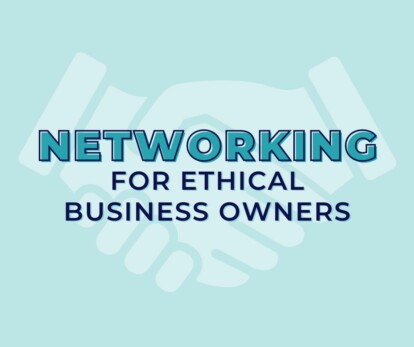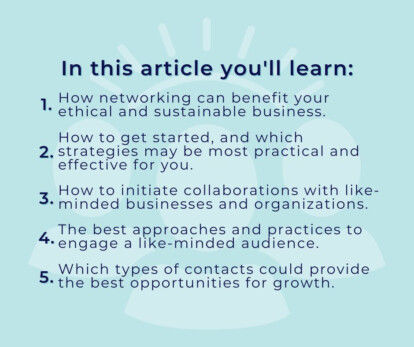Fashion victims: Animal exploitation in the fashion industry


Building a strong network is crucial for the success of any business, but for ethical, vegan, and sustainable enterprises, it provides unparalleled opportunities.
Networking events and activities, on and offline, can enable you to connect with other like-minded business owners, potential customers, ethical suppliers and manufacturers, investors (including less traditional avenues for funding), and industry experts.
It also opens up opportunities for collaboration, knowledge sharing, and growth, which is especially important when you’re striving to create a new type of business or to develop an organisation that would fit a circular economy, for example.
With so many demands on your time, we know that networking may be low on your list of priorities. Big challenges in this area include knowing which networks would be the right fit for your ethical business and knowing how to make the most of your networking efforts.
Even in the face of these challenges, networking could be the missing piece of the puzzle when it comes to successfully growing your sustainable business because it:
Networking can help you to establish your brand and build awareness in a number of ways. You can share your ethical business practices, information about the causes you support, what you sell and why, sustainable supply chains and so much more.
Engaging with like-minded individuals and organisations is a great way to enhance your credibility and reputation, becoming a leader in your field. You may also be able to reach businesses and individuals that aren’t yet operating sustainably and help to show them a different way of working.
By connecting with other ethical business owners, you can explore collaborations, partnerships, and joint initiatives. Collaborations can expand your reach, pool resources, and drive collective impact.
For example, if you run a zero-waste shop, networking is a great way to meet local suppliers or creators who can run workshops, tell their customers about you, or cross-promote joint events.
Networking can introduce you to potential customers who align with your ethical values, either directly or by connecting with ethical businesses that share a similar audience to you.
By building relationships with potential customers, you should see an increase in sales and begin to build a loyal base of people who know, like and trust you because either they’ve dealt with you first-hand or know someone else who has.
One of the major advantages of a good network is the potential to connect with experts, influencers and people who can make referrals.
You may meet people who can offer valuable insights, advice, and support, especially if they’re further into their business journey. Learning from their experiences – be it advice about marketing, manufacturing, acquisition, finances, funding, new ways of running a business that breaks with traditional models, or something else – can help you grow and improve your organisation.
Through networking, you may be able to meet potential investors or grant organisations that support ethical businesses. This can open alternative avenues to traditional lending. For example, you may find that your local universities offer funding to sustainable businesses in their networks.

Knowing the potential benefits of networking is one thing, but how can you find the right opportunities for your business? Should you be attending face-to-face networking groups? Are there online groups that might be helpful? What other ways can you grow your network? These are all important questions.
Below, we’ve put together some tips to help you get started:
This is possibly the most important piece of advice that we can give you about networking. People often go into networking thinking about what they can get from it. However, every relationship in your network should be about give and take.
No one wants to be on the receiving end of a hard sell or used for their connections. Instead, it’s important to build your network with a view to giving as much, if not more, than you receive.
Listen to people, ask what they need, make referrals that you genuinely think will be helpful, share content that has value, ask questions, be interested, and be open to learning and new opportunities.
In our experience, it’s this open, giving approach that usually delivers the best results!
Participate in conferences, trade shows, and events related to your industry.
These gatherings provide opportunities to meet fellow entrepreneurs, industry experts, innovators, and potential partners. Look for events specifically focused on sustainability, veganism, or ethical business practices, as well as events focused on your particular field or industry (e.g., beauty events, food and drink events, and so on).
This won’t be applicable to every ethical business, but if there are relevant professional associations and organisations related to your industry or cause, they may be worth joining.
These groups often host networking events, workshops, and webinars that can connect you with other ethical business owners.
It’s a great idea to reach out to local non-profit and non-governmental organisations (NGOs) that align with your values. This might include university or college departments, as well as student groups (e.g., Sustainability Societies, Vegan Societies, etc.)
Non-profit organisations, in particular, may welcome the opportunity to collaborate on initiatives as a way to extend their reach. You could also sponsor events to build relationships with like-minded individuals and organisations.
Look for local meetups, workshops, and seminars focused on sustainability, veganism, or ethical entrepreneurship. These gatherings provide a platform to meet potential customers, partners, and advocates.
Leverage social media platforms like LinkedIn, Facebook, Instagram, and Twitter to connect with individuals and businesses in your industry.
You’ll see the best results when you engage in conversations, share valuable content, and actively participate – again, with the intention of making a positive contribution – to relevant groups and communities.
If you can offer tips, insights or even words of encouragement to people in a relevant Facebook group, for example, you may find that you’re top of mind when they need the kinds of products or services that you provide.
In our blog about why young people are driving the vegan movement, we saw that social media is playing a vital role in connecting people and empowering them to champion the causes they care about.
While you may not directly think of it as building your network, establishing yourself as a thought leader by creating high-quality content through blogs, videos, or podcasts is a great way to become the “go-to” person in your field.
Share your expertise, insights, and experiences related to ethical business practices. This can attract a like-minded audience and foster connections.
You might be surprised by the array of online networking opportunities that exist outside of social media. Look for online forums, discussion boards, and community platforms that cater to sustainable, vegan, or ethical audiences.
Contribute to discussions, offer assistance, and share your knowledge to establish relationships with other members.
It’s worth exploring local business networking events and meetups in your area. These events can provide opportunities to connect with other entrepreneurs, potential customers, and investors who may share your ethical values and are situated nearby.
They won’t all be a good fit, and it’s important to research the kinds of businesses that attend, the format the events take, and any fees you might be expected to pay. That being said, you may find some local gems that give you in-person contacts.
It can be incredibly helpful and empowering to have an experienced mentor in your corner, especially someone who has expertise in ethical business practices. They can provide guidance, support, and introductions to their networks.
Look for influential individuals, bloggers, podcasters, or social media personalities who are aligned with your values and target audience. These influencers don’t have to be household names with millions of followers! Instead, they could be passionate, purpose-driven people who support a cause that you care about and who have a small but engaged following.
Collaborating with them through partnerships or sponsored content can help you expand your network and reach.
It’s easy to think of networking as slightly intimidating! You may have visions of suited people thrusting business cards in your face and making Powerpoint presentations.
In reality, though, networking is often far more relaxed and informal.
A more helpful perspective is to view networking as an opportunity to build your community, to meet kindred spirits who are making a difference in the world too and striving for a more sustainable future.
Find the right people, and you can lift each other up, share resources, and create meaningful change, as well as have a team in your corner, even if you work alone.